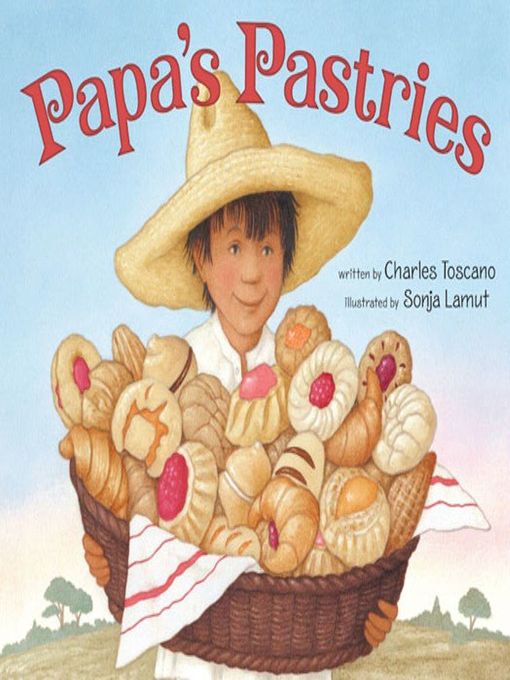
Papa's Pastries
فرمت کتاب
ebook
تاریخ انتشار
2010
Reading Level
2
ATOS
3.4
Interest Level
K-3(LG)
نویسنده
Sonja Lamutناشر
Zonderkidzشابک
9780310424086
کتاب های مرتبط
- اطلاعات
- نقد و بررسی
- دیدگاه کاربران
نقد و بررسی

August 23, 2010
Effective use of repetition and a pleasing rhythm invigorate debut author
Toscano's predictable but touching tale about the rewards of faith and neighborly compassion. When Miguel accompanies his Papa on a day's journey to three villages, people respond to Papa's singing with joyful dancing, but cannot afford his homemade pastries. Lamut's (Thanksgiving Is for Giving Thanks) full-bleed watercolors set earth-toned hues against pale blue-gray washes, while alternating half-spread paintings are framed against white backgrounds. The illustrations, which depict thin, barefoot, ragged villagers weaving, transporting wood, and selling various goods, effectively convey communal warmth and industry against a backdrop of poverty and looming fear. After giving away all their goods, Miguel and Papa return empty-handed to their broken-down hut, where the distraught, hungry faces of Miguel's siblings capture the emotional and physical cost of Papa's generosity. However, the story's moral, delivered by Papa—"Kindness is far more valuable than money"—proves true as the recipients arrive with generous offerings of their own the next day. Papa's morning prayer and Miguel's evening prayer frame the story, demonstrating the passage of faith from one generation to another. Ages 4–7.

August 1, 2010
The golden rule gets the spotlight in this tale of selflessness. To provide for their large family, Miguel and his father travel from town to town to sell delicious pastries. Each town welcomes the duo's arrival through song and dance, though the poor cannot afford the treats. Feeling pity for their plight, Papa graciously donates his baked goods to the struggling villagers. Concern for their family's welfare causes Miguel and his mother to question this generosity, but his gift is returned threefold when the recipients share their skills with Papa and his growing brood. By focusing on prayer's inspirational power rather than specific doctrine, the nondenominational approach appeals broadly. The religious message cannot escape an earnest wholesomeness, though it refrains from didacticism. Biblical quotations support the straightforward narration. Repetitive dialogue builds the familiar arc to its uplifting conclusion, though the nondescript Latin setting cannot root it. Soft colors suit the quiet message; rounded shapes reveal a sweet vulnerability within each light spread. Overall, Christian charity receives a gentle endorsement. (Picture book. 4-8)
(COPYRIGHT (2010) KIRKUS REVIEWS/NIELSEN BUSINESS MEDIA, INC. ALL RIGHTS RESERVED.)

November 1, 2010
K-Gr 2-On a cold morning, Miguel wakes up to the sound of raindrops dripping from the hole in the roof of his house. Outside, he overhears his father's worried prayer in which he asks God for a new roof, firewood he needs for his pastry business, and clothes for his family. Without these things, they will not survive. Together, Miguel and his father fill a large sack with already made pastries, and they journey to three nearby villages where they hope to sell them. When they enter each village, Papa sings and the villagers sing, dance, and clap along with him, for he is well known for his beautiful voice. But times are hard, and no one has money for his wares. When he notices villagers who need help, he ends up giving all his pastries away. When he returns home, Mama is clearly exasperated. The next morning brings a heartwarming solution to the family's woes as neighbors from the three villages come to visit and use their various talents to repay Papa's kindness. That night, Miguel prays, "Thank you for your loving kindness. And thank you, Lord, for my Papa. Amen." Soft, sweet illustrations accompany this gentle story. The use of Spanish words and the pictures of the people, landscape, village scenes, and clothing suggest that the setting is Mexico or perhaps, a South American country.-Mary N. Oluonye, Shaker Heights Public Library, OH
Copyright 2010 School Library Journal, LLC Used with permission.

November 1, 2010
Preschool-G Good deeds and faith play a major role in this parable about trusting in providence. Young Miguel and his family live in a small house with a leaky roof. Winter is coming, firewood is scarce, and the childrens clothes are worn thin. Papa is sure, though, that when he brings his last batch of pastries to market, the money he makes will be more than sufficient. Alas, Miguel, accompanying his father, grows more and more anxious when, in village after village, no one buys the treats, citing their own hardships. What is worse, kindhearted Papa keeps giving away pastries to people with hard-luck stories. Kindness is far more valuable than money, Papa says. Reward comes the next day when the pastries recipients respond to the familys need in kind. Although the story is predictable, its Mexican-countryside setting sets it apart. Lamuts idealized illustrations portray warm characters in traditional costumes, dancing, singing, and marketing. A good choice for collections where there is demand for religion-themed stories.(Reprinted with permission of Booklist, copyright 2010, American Library Association.)

























دیدگاه کاربران